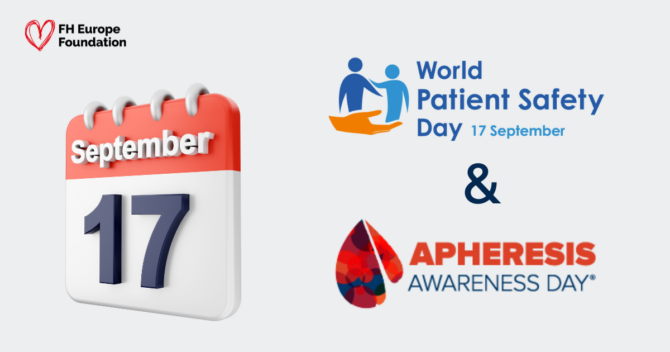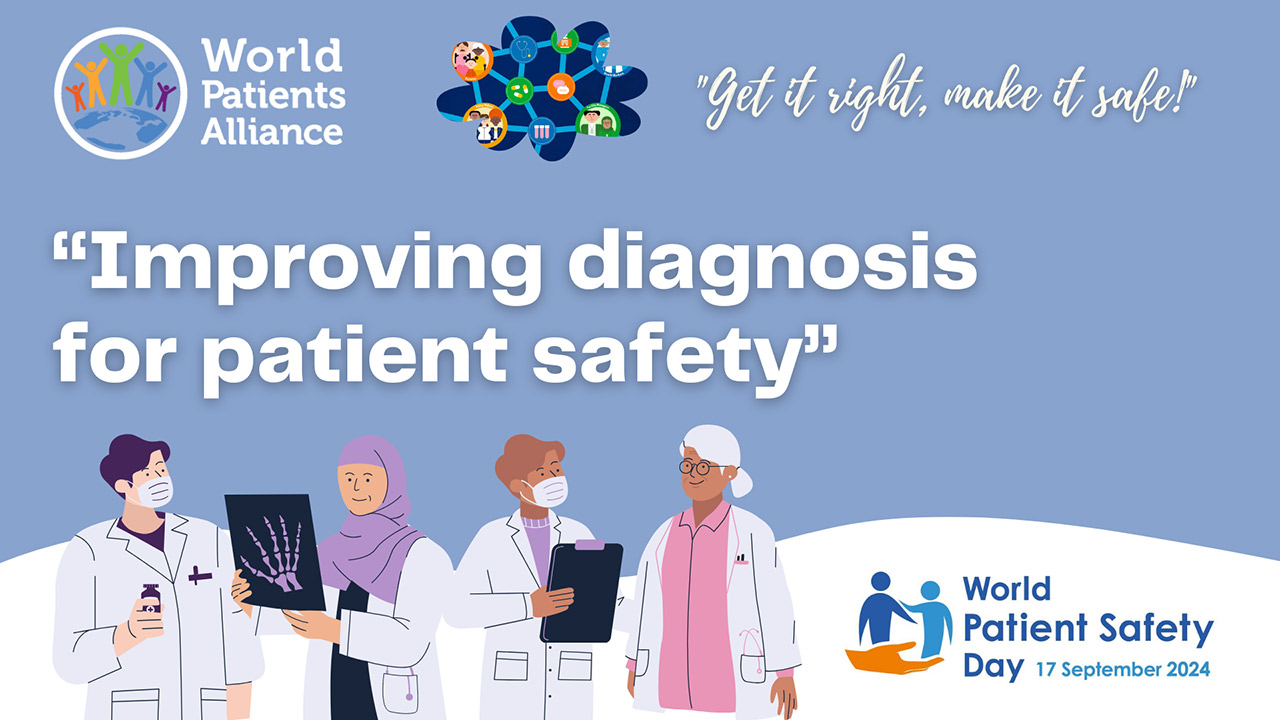
Apheresis Awareness Day is held annually on the third Tuesday in September, while World Patient Safety Day is observed every year on September 17. In 2024, those two days occur on the same day. And both are very relevant and important to our community of individuals and families living with inherited hyperlipidemia.
This year the theme of World Patient Safety Day is “Improving diagnosis for patient safety” with the slogan “Get it right, make it safe!”, highlighting the critical importance of correct and timely diagnosis in ensuring patient safety and improving health outcomes.

Against the wider backdrop of the current efforts to make the Cardiovascular Health Plan for Europe a reality, ahead of the FH Awareness Day and the World Heart Day and finally with the big projects promoting precision medicine, specifically in the FH, like PERFECTO, PerMedFH and FH Early Screening, it is important to reflect on the meaning of those two days for people who are affected with genetic lipid conditions and who to some extend undergo Apheresis.
On this occasion, we have prepared a special blog by Elsie Evans, FH Europe Foundation Ambassador Program Manager and a person living with HoFH, who due to the rare and severe form of FH has been undergoing aphaeresis for most of their life.
As we observe Patient Safety Day and Apheresis Awareness Day, it's essential to reflect on their significant impact on patients' lives. For those of us living with inherited lipid conditions like Homozygous Familial Hypercholesterolaemia (HoFH), these days are not just dates on a calendar— they are reminders of the importance of early detection, accurate diagnosis, individualised treatment, and the ongoing journey towards better health and quality of life.
The mantra "Get it right, make it safe" resonates deeply with us. Accurate diagnosis and individualised treatment are essential for patient safety and effective management of conditions like HoFH. Early diagnosis, informed by genetic testing, allows for timely and appropriate interventions. Personalised treatment plans ensure that therapies are tailored to our specific needs, enhancing our quality of life and long-term health.
Apheresis is a life-saving treatment for many HoFH patients (as well as those with elevated Lp(a) and even those with FCS during pregnancy).
Aphaeresis is a procedure, which involves filtering the blood to remove excess LDL cholesterol, significantly improving outcomes for people with HoFH. However, it also comes with its challenges. Regular apheresis sessions can be time-consuming (taking place weekly, or every two weeks, for 5 hours on´average) and physically demanding, impacting our daily routines and overall well-being. Apheresis is an invasive procedure, associated with a high risk of infections. For children and people, who suffer from trypanophobia (an intense fear of needles), this life-saving therapy can be psychologically and emotionally taxing. Despite these challenges and lack of understanding of the quality of life impact the benefits of apheresis in managing cholesterol levels and preventing cardiovascular complications are still advocated for as first-line treatment. This deserves more attention with a variety of new options becoming available and therefore widening the choice for us as individuals.
Patient Safety Day serves as a crucial reminder of the importance of safe and effective treatment protocols. For those undergoing apheresis, ensuring that the procedure is performed safely is paramount. Prioritising patient holistic care, healthcare providers can help us feel more secure and supported during our treatments.
Keeping all this in mind, the critical role of genetics in diagnosing and treating lipid disorders cannot be understated. Understanding the genetic basis of inherited lipid conditions allows for early detection and the development of individualised treatment plans. During our HoFH Awareness Day Trilogy webinars, experts emphasised the importance of genetic testing in identifying at-risk individuals and tailoring treatments to their specific genetic profiles. This personalised approach ensures that we receive the most effective therapies for the right person at the right time, improving our outcomes and quality of life.
As we commemorate World Patient Safety Day and Apheresis Awareness Day, let's remember the importance of the individuals and families, who depend on accurate diagnosis, personalised treatment, and patient safety. By raising awareness and advocating for better care, we can make a meaningful difference in the lives of people living with these conditions everywhere.
With the international efforts to make cardiovascular health a public health priority, we must be acutely aware of the importance of safety, quality of life and the progress we have made in research and science to Get it right and make it safe.
Listen to stories of international patient ambassadors, advocating for patient safety and raising awareness of aphaeresis.
2. Penilla Gunther about the global perspective and the need for standardised practices.
3. Maria Nassif, HoFH patient and ambassador, about the importance of diagnosis, the right treatment and patient safety.
4. Athanasios Pallidis, FH patient and ambassador, about what patient safety means to him as a patient.
4. Athanasios Pallidis, FH patient and ambassador, about how healthcare professionals can enhance patient safety during the diagnostic process.
4. Athanasios Pallidis, FH patient and ambassador, about the role policymakers can play in advancing patient safety.
4. Athanasios Pallidis, FH patient and ambassador´s message to our community on advocating for themselves as well as the larger community about asking questions and helping make safety a priority.